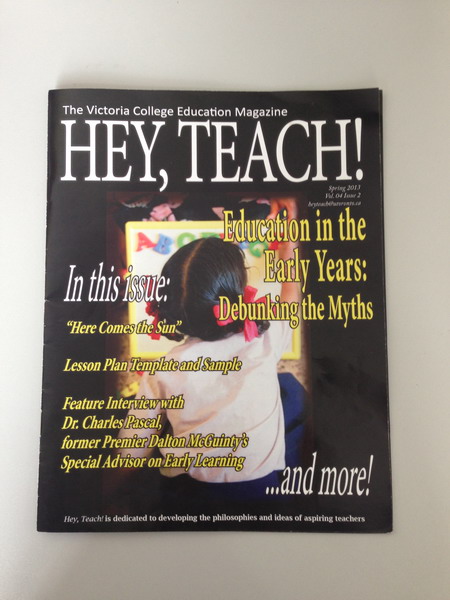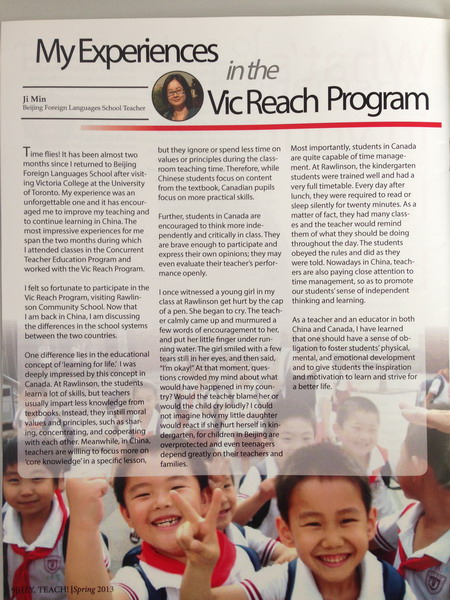·【多伦多大学学习报道】我校英语教师在VIC Reach项目中的交流经历
发布日期:2013-05-03 信息来源:
我是季敏,担任北外附校初三年级组长职务和英语教学工作。2012年9月,我有幸被学校派到加拿大多伦多大学学习。在一学期里的学习期间,我收获了很多。回国后,我利用寒假时间写了一篇短文通过邮件形式发送给了我在多大学习时的老师Professor Jackie Eldridge ,文章中我主要从教育理念、道德价值观、学生的独立思维与批判性思维能力的培养以及时间管理四个方面简要谈论了两国学校教育体系的差异和自己的体会与感受。
在Professor Jackie 和另一位老师Professor Sheila的帮助下,今年3月我的文章有幸被发表在维多利亚学院的教育期刊《HEY,TEACH!》 杂志上。感谢两位老师,更感谢北外附校给我这次学习的机会,我会将自己所学到的理论知识和教学方法在教学中不断实践与探索,努力提高,从而更好的为学生们服务。
(初三年级组 季敏)
附:
My Experiences in the Vic Reach Program
Ji Min Beijing Foreign Language School
Time flies, it has been almost two months since I returned to Beijing Foreign Languages School after visiting Victoria College at the University of Toronto. My experience was an unforgettable one and it has encouraged me to improve my teaching and to continue learning in China. The most impressive experiences for me span the two months during which I attended classes in the Concurrent Teacher Education Program and worked with the Vic Reach Program.
I felt so fortunate to participate in the Vic Reach Program, visiting Rawlinson Community School. Now that I am back in China, I am discussing the differences in the school systems between the two countries.
One difference lies in the educational concept of “ learning for life”. I was deeply impressed by the concept in Canada. At Rawlinson, the students learn a lot of skills, but teachers usually impart less knowledge from textbooks. Instead, they instill moral values and principles, such as sharing, concentrating, and cooperating with each other. Meanwhile, in china, teachers are willing to focus more on ”core knowledge” in a specific lesson, but they ignore or spend less time on values or principles during the classroom teaching time. Therefore, while Chinese students focus on content from the textbook, Canadian pupils focus on more practical skills.
Further, students in Canada are encouraged to think more independently and critically in class. They are brave enough to participate and express their own opinions; they may even evaluate their teacher’s performance openly.
I once witnessed a young girl in my class at Rawlinson get hurt by a cap of a pen. She began to cry. The teacher calmly came up and murmured a few words of encouragement to her, and put her little finger under running water. The girl smiled with a few tears still in her eyes, and then said” I am ok!” At that moment, questions crowded my mind about what would have happened in my country? Would the teacher blame her or would the child cry loudly? I could not imagine how my little daughter would react if she hurt herself in the kindergarten, for children in Beijing are overprotected and even teenagers depend greatly on their teachers and families.
Most importantly, students in Canada are quite capable of time management. At Rawlinson, the kindergarten students are trained well and had a very full timetable. Every day after lunch, they were required to read or sleep silently for twenty minutes. As a matter of fact, they had many classes and the teacher would remind them of what they should be doing throughout the day. The students obeyed the rules and did as they were told. Nowadays in china, teachers are also paying close attention to the time management, so as to promote our students’ sense of independent thinking and learning.
As a teacher and an educator in both China and Canada, I have learned that one should have a sense of obligation to foster student’s physical, mental and emotional development and to give students the inspiration and motivation to learn and strive for a better life.






